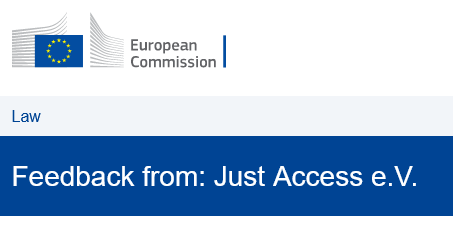
Using the opportunity to influence the shaping of laws and policies of the European Commission, today we submitted our feedback on the roadmap for 2021 EU Justice Scoreboard.
We are conveying our feedback integrally:
Just Access, a registered German NGO focused on access to justice, applauds the EU Justice Scoreboard, including its section 3.2.1 specifically dedicated to Accessibility.
While the quantitative element of this comparative exercise is unavoidable and in many ways useful, we recommend the regular and thorough revision of the Scoreboard’s metrics. In addition to being a formal and immediate obligation, the provision of justice is also an aspirational exercise, a tool to continue pushing the boundaries of human rights and social justice. Neither EU norms nor the law itself remain static; but the Scorecard’s quantified criteria themselves, as well as their underlying methodologies, risk undermining this vital aspiration.
For instance, the Scoreboard’s metrics on caseload ignore and arguably misrepresent the number of EU citizens involved in litigious cases. The number of cases per 100 inhabitants is in many ways less relevant than the number of people involved in the cases, and their experience within the EU judicial systems. Preference for, or transition from litigation into, alternative resolutions, such as mediation, reconciliation, and community justice, is another meaningful but missing metric. Similarly, legal experts increasingly acknowledge the importance of insights from adjacent disciplines, such as cognitive and decision sciences, which have demonstrated that judicial independence can be compromised through double-hatting, revolving doors (e.g. between the judiciary and the legislative, as well as the executive branches), small gifts, and other phenomena that ‘classic corruption’ metrics applied in the Scoreboard fail to take into account.
In sum, Just Access regards the EU Justice Scoreboard as a tremendously useful and powerful tool, which must be systematically updated in accordance with evolving standards and practices in domestic, EU, and international law.



